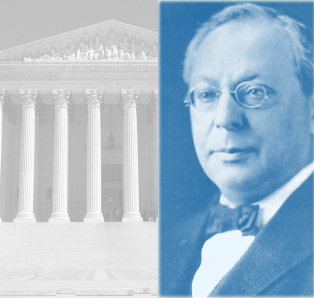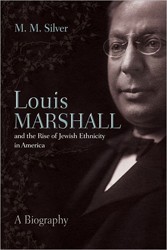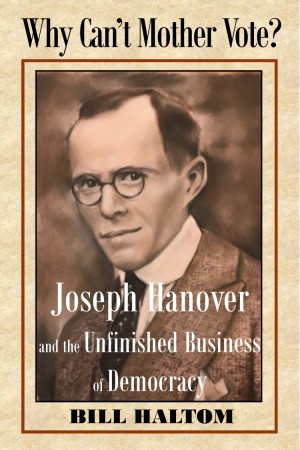 The main challenge I faced when preparing a biography of Louis Marshall stemmed from the gap between the perceptual confidence that characterizes American Jewish life in the 21st century and the tensions and insecurities of Jewish life in the United States during the first decades of the 20th century. The trick, I believed, was to create an intelligible dialogue between these differing modes of thought and feeling. To recreate historical events uncritically, exactly as Marshall and his peers saw them, would draw contemporary readers into a morass of inhibition about being “too Jewish” that is foreign to them, whereas to overlook realities and attitudes that were indisputably part of Marshall’s American Jewish milieu would be condescending and, worse, injurious to empirical rules of historical scholarship.
The main challenge I faced when preparing a biography of Louis Marshall stemmed from the gap between the perceptual confidence that characterizes American Jewish life in the 21st century and the tensions and insecurities of Jewish life in the United States during the first decades of the 20th century. The trick, I believed, was to create an intelligible dialogue between these differing modes of thought and feeling. To recreate historical events uncritically, exactly as Marshall and his peers saw them, would draw contemporary readers into a morass of inhibition about being “too Jewish” that is foreign to them, whereas to overlook realities and attitudes that were indisputably part of Marshall’s American Jewish milieu would be condescending and, worse, injurious to empirical rules of historical scholarship.
American Jewish history is happily devoid of the angst that characterizes Jewish life on other continents and in other contexts. It is perfectly reasonable for contemporary readers to assess critically the self-defense labors of previous generations of American Jews, and conclude, in some instances, that past Jewish leaderships were overly defensive and inhibited, even in ways that could be paranoiac or self-defeating.
Yet this critical license to look at the past heroes of American Jewish life as high-strung, occasionally histrionic, figures can be taken much too far; and to my mind, at least, much of the finest recently published scholarship on American Jewish life in periods and context applicable to Marshall’s life, such as the Roaring Twenties, is flawed to some extent by researchers’ anachronistic projection of Jewish life in America in the late 20th century or early 21st century onto the American Jewish past. Scholars who focus on how Jews came to feel “at home” in America in a period like the 1920s tend to under-emphasize the extent to which anti-Semitism was a constant presence in the minds and real life circumstances of both well-established Jews, and struggling immigrant Jews.
Writing draft chapters of the biography, I recalled how the great English historian E.P. Thompson, whom I idolized in my college years, warned about how the “enormous condescension of posterity” can lead historians toward breathtakingly incorrect conclusions about the life choices reached by the heroes of the past. Along these lines, I ruminated about how anachronistic soft-pedaling of anti-Semitism as a real force to be reckoned with on the landscape of early 20th century America could produce blind spots in a biographer’s evaluation of Marshall’s life course.
A revealing case in point is the story of why Louis Marshall never won a Supreme Court appointment. In view of Marshall’s stellar accomplishments as an attorney, which were lauded by legal luminaries such as Benjamin Cardozo, and the fact that Marshall himself lobbied in at least two instances for an appointment and had powerful allies such as Jacob Schiff on his side, scholars have long pondered about the non-attainment of this goal. Misinterpreting a cryptic remark attributed to William Howard Taft, the President who did not appoint him to the Supreme Court bench, generations of scholars concluded that the story’s gist has to do with political partisanship (the Republican Taft’s remark about Marshall’s non-appointment referred to the latter’s law partner, Samuel Untermyer, an outspoken Democrat), or other relatively innocuous topics.
Though I stumbled onto the answer to the riddle of the non-appointment early in my research, I originally planned to relegate the subject to an extended footnote, largely because of the discomfit inherent in correcting my teachers’ teachers in the role of an impish smart aleck. Everything that had ever been written on this topic was dead wrong, but ultimately the point is moot because Taft nominated the eminently qualified Charles Evans Hughes, and any conclusion as to whether he “almost” or “might have” tapped Marshall for the job would be predicated speculatively on the President’s state of mind.
As chapter fragments began (much to my surprise) to consolidate as the draft of a full biography, it became obvious that the subject could not be kicked downstairs into a footnote. In spring 1910 Marshall badly wanted to became a Supreme Court Justice, and the disappoint which this frustrated ambition engendered clearly had biographical consequences that couldn’t be ignored.
Moreover, to remove from the tale of Marshall’s life the character responsible for making his Supreme Court bid a non-starter, Hearst newspaper editor Arthur Brisbane, probably the most influential journalist of the era, would have excised from the biography one of its most compelling and dramatically poignant ironies. As it turns out, the same person responsible for the most crushing disappointment in Marshall’s professional career, was later a decisive collaborator in the most inspiring accomplishment of Marshall’s work as a Jewish advocate (Henry Ford conditioned the release of his apology to the Jews on Brisbane’s involvement, and Brisbane cooperated fully with Marshall in this triumphant moment).
The issue, I realized, had been incorrectly formulated, largely because of anachronistic wishful thinking about American sociopolitical realities a century ago. The way the question has to be posed is not “why did Marshall lose his Supreme Court bid,” but rather “why was such a nomination a non-starter”? Were we to ignore how saturated by Jew hatred Marshall’s circumstances became once his desire for a place on the bench became public knowledge, we would be in danger of misunderstanding how he calibrated levels of assertiveness in subsequent Jewish defense efforts against Ford, the KKK and others anti-Semites. In fact, we might overlook the roots of his motivation as a Jewish leader in America were we not to see what he saw when he pursued his highest career ambition, and feel what he felt when he saw that desire derided savagely in mass media attacks that were rife with anti-Semitic innuendo about greedy corporate lawyers being unworthy of the highest bench in the land. Louis Marshall’s law firm, wrote Arthur Brisbane in a syndicated column that opposed and ridiculed his bid for the Supreme Court, is founded on the “contention that the poor have no rights when their presence interferes with the delicate sensibilities of the rich.” One need not fret about Marshall’s quashed ambition, the Hearst papers exulted in upper case glee, because his firm “WILL PROBABLY HAVE PLENTY OF IMPORTANT LUCRATIVE WORK ON ITS HANDS FOR MANY YEARS TO COME!”
So, what did Louis Marshall see when he threw his hat in the ring for the Supreme Court bench? What was President Taft really talking about when he asked Jacob Schiff sarcastically “would you name Sam Untermyer’s partner to the Supreme Court?” Well that’s a story about resort cottages, tuberculosis treatment, Macy’s department store, Lakewood New Jersey and many things I never imagined needing to write about when I began this biography project, and ended up detailing to avoid a free fall into the abyss of enormous condescension evoked by E.P. Thompson’s stricture.
Join M. M. Silver for the Louis Marshall and the Rise of Jewish Ethnicity in America: A Biography book launch on March 12th at Congregation Emanu-El in NYC. More information about this event can be found here


